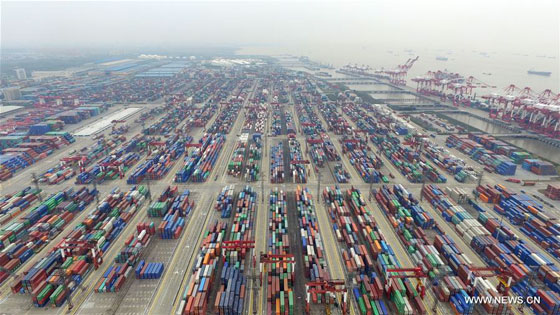China's 40 years of reforms and opening-up offer lesson to India
- By Rabi Sankar Bosu
 0 Comment(s)
0 Comment(s) Print
Print E-mail China.org.cn, May 14, 2018
E-mail China.org.cn, May 14, 2018

This year is the 40th anniversary of China's landmark economic reforms and opening-up which have not only changed the country in a fundamental way, but have also had a great impact on the whole world.
A famous Chinese philosopher once said: "A journey of a thousand miles begins with a single step." And so during the Third Plenary Session of the 11th Communist Party of China (CPC) Central Committee in December 1978, then Chinese Vice Premier Deng Xiaoping initiated the epoch changing "open-door" policy declaring a new turning point in China's economic management and trajectory. A few words of his famous speech deserve to be quoted here: "Without reform and opening-up, there will be no hope for China and the country and the ruling party will perish."
The CPC's successful political, economic and social stewardship is effectively found in China's amazing Gross Domestic Product (GDP) which reached 82.71 trillion yuan last year, about 230 times that of 1978. China has yielded fruitful results in its agriculture sectors, industrial structure, employment structure and level of innovations.
China's international standing has risen before the world in unprecedented ways. The CPC and its leaders, past and present, have forced the West to tear down the "bamboo curtain" they erected around her and welcome her as a respected and influential member of the international community. China became a member of the World Trade Organization in 2001. It became the world's largest trading nation in 2013, overtaking the U.S. Since October 2016, the RMB has been included in the SDR basket as a fifth currency.
President Xi Jinping in his report to the 19th CPC National Congress last October rightly pointed out: "The Chinese nation, with an entirely new posture, now stands tall and firm in the East." China's proposals of notions such as a community with a shared future for humanity, win-win cooperation, the Belt and Road Initiative and several international trade facilitation and benefit-sharing policies lend credence to China's leadership on the world stage.
In these uncertain times, our world needs China's effective leadership for global public goods. It is hoped that China should continue to promote its reform and opening up drive and improve the investment environment for foreign companies. Hopefully, in the 2018 Boao Forum for Asia Xi reaffirmed China's commitment to further opening-up and deepening the reform and unveiled a set of major new measures for common prosperity of both China and the world. "China's door of opening-up will not be closed and will open even wider," Xi declared.
However, China's decades of strong economic development, reform and opening-up is not completely accomplished. As of the end of 2017, there were around 30 million Chinese still living below the national poverty line. As such, in realizing the "Two Centenary Goals" and the "Chinese Dream," China has focused on safeguarding and improving people's well-being, advancing all social programs, and protecting people's rights to equal participation and development. Xi said that "no one should be left behind on the road towards Xiaokang."
On the other hand, India is a great country but it has a lot to learn from China's approach to economic reform and policy action. From poverty alleviation to reducing pollution, basic education to life expectancy, technological innovations to market economy, China is far ahead of India. The average Chinese people's standard of living offers significant lessons for developing countries like India.
China is willing to further exchange and cooperate with India in the realm of poverty reduction. India's various welfare schemes will get a tremendous boost if it can learn lessons from China's experience and achievements in poverty alleviation through the Southwest Poverty Reduction Project, the Poor Rural Communities Development Project, the Guangxi Rural Poverty Alleviation Pilot Project, the Qinba Mountains Poverty Reduction Project, the Gansu and Inner Mongolia Poverty Reduction Project, to mention a few.
There is no denying that poverty is a huge stone in the path of India's development. Poor Indians need money, want jobs to fulfill their basic needs, not election-oriented budgets. Mother India would win then and only then if Indian political leaders make every effort to quickly eradicate poverty from the country, bringing prosperity into the lives of poor people through a sound political vision. India still waits for "good days" as promised by the current Indian government.
Rabi Sankar Bosu, Secretary of New Horizon Radio Listeners' Club, West Bengal, India
Opinion articles reflect the views of their authors only, not necessarily those of China.org.cn.





